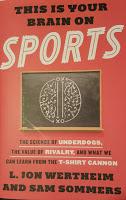 The Science of Underdogs, the fan mentality and more is evaluated in the book "This Is Your Brain on Sports" by John Wertheim and Sam Sommers.
The Science of Underdogs, the fan mentality and more is evaluated in the book "This Is Your Brain on Sports" by John Wertheim and Sam Sommers.Sports psychology is the basic understanding of why we do what we do on and off the field, the golf course, how we react as fans, how thoughts translate into real life and how we can use what we learn to understand and improve our lives.
No doubt you have heard the phrase "Golf is ninety percent mental", and, even though we only think about that phrase in relation to playing the game, the psychology and attitudes of fans and pros play heavily into our psyche.
Here are several points which I took away from "This Is Your Brain on Sports - The Science of Underdogs, The Value of Rivalry and What We Can Learn from the T-Shirt Cannon."
Think about these ideas the next time you are in these situations as a player, as a fan or as someone who lives with this type of "fan"-atic.
1. Let's start with the sub-title of the book - T-Shirt Cannon and what we can learn from it.
Why does shooting a T-Shirt out of a cannon (or pitching a golf ball to the crowd for the sake of our blog) keep fans coming back to a stadium, arena or course, even if the team (or golf pro) is losing?
The book claims that it is because the T-Shirts are free "...and free is catnip to humans, an enticement so strong it sometimes causes us to behave ridiculously...". I cannot personally relate to this theory as I do not go to a golf course to catch tossed golf balls from Jordan Spieth although one of my favorite memories is carrying the Sunday standard for Annika Sorenstam and her pitching me her golf ball after making a birdie.
2. Effort Justification is defined by Psychology Dictionary as, "The phenomenon where people evaluate a task more favorably when it involves something difficult or unpleasant."
The book tells us, "When we pay for access to a gym, for example, we often come to value a group more than when the access comes for free."
3. We're All "Comeback Kids" - After a tragedy or a physical ailment which may keep someone from playing a sport, isn't it amazing how we read about how the athlete made an unprecedented return? We, as humans, are quite resilient.
4. Rooting for the Underdog or remaining loyal to consistently losing teams - oh, how many times I have cheered on Phil Mickelson in spite of knowing that he was nowhere near a win but, when he finally DID win, the experience was further overwhemed by joy and exuberance, almost like I had won!
5. Praise is important but it's the right kind of praise that truly makes the athlete. Praise for effort, not necessarily for the win. ParentingScience.com further emphasizes to, "Encourage kids to focus on mastering skills—not on comparing themselves to others." One of the things I enjoy most about watching golf is at the very end of their round, golfers almost always praise their playing partners.
This book is not for everyone - but it is an important work if you want to delve deeper into the psyche of human nature and enjoy reading about a broad sports culture through a fan's point-of-view. The press release best related what "This Is Your Brain on Sports" is trying to convey - it "celebrates the quirkiness of sport while revealing something deeper about who we are, what we care about and the forces that shape our behavior.
Have You Read -This Is Your Brain On Sports-? Share your opinion on Twitter @Golf4Beginners and in the comments section of this Golf for Beginners blog.

